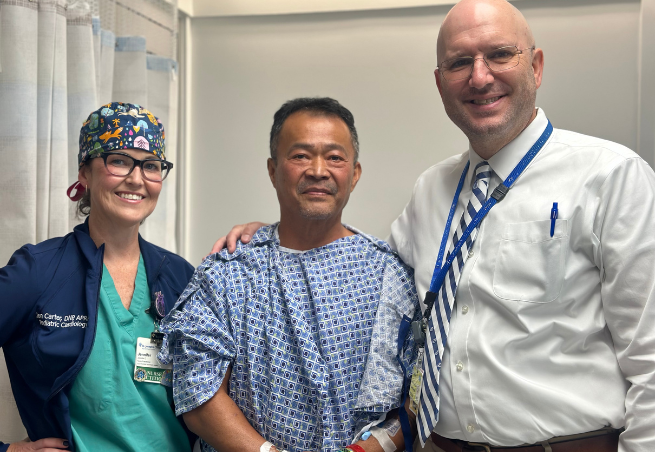Approximately 40,000 infants are born with a congenital heart defect (CHD) annually in the United States. Thanks to research and medical advances, the majority of individuals with CHD now survive through adulthood and live quality lives. According to the American Heart Association, adults now surpass children among the more than 2.4 million people living with CHD in the United States.
For decades, babies and children with CHD have been successfully treated with open-heart surgery. However, significant recurrent pulmonary valve dysfunction, usually valve leakage, is typical after surgery and generally worsens during adolescence and early adulthood, indicating a need for valve replacement. In the past, the only way to replace the pulmonary valve was to repeat open-heart surgery.
That changed in 2010 with the introduction of the U.S. Food and Drug Administration-approved Melody® Transcatheter Pulmonary Valve by Medtronic and the groundbreaking technique of congenital transcatheter heart valve implantation. This minimally invasive procedure has emerged as a transformative option for individuals born with congenital heart defects.
The transcatheter approach involves accessing the heart through blood vessels, typically the femoral artery in the thigh, rather than through open-chest surgery. This significantly reduces the trauma associated with traditional procedures and accelerates recovery times. In the case of congenital heart valve defects, this technique has proven to be revolutionary.
A vanguard of these cardiology advancements, Jeremy Ringewald, M.D., a board-certified pediatric cardiologist with Pediatrix® Cardiology Associates and Tampa Bay Adult Congenital Heart Center, placed the first Melody valve in Tampa Bay in 2011, just months after it received FDA approval. He placed the first Medtronic Harmony™ valve in Florida in 2021, and since 2022, he has performed more procedures using the Edwards SAPIEN 3 valves with Alterra adaptive prestent than any program in the world.
“This has been a real game changer and has just gotten better as we’ve gotten more technology,” said Dr. Ringewald. “The manufacturers have jumped in with both feet to support our patient populations. The vast majority of people with congenital heart disease end up with open-heart surgery and eventually face dysfunction with one of their four heart valves caused by valve leakage. They will need a valve replacement as a teenager or young adult, and this gives us a non-invasive way to implant a new valve.”
As one of the leading congenital transcatheter valve interventionalists in the world and a global leader in implanting congenital transcatheter heart valves, Dr. Ringewald and his congenital cardiac team recently implanted their 250th congenital transcatheter heart valve at the Patel Children’s Heart Institute at St. Joseph’s Children’s Hospital.
“This milestone is significant to our entire congenital cardiac team because it means that 250 children and adults with congenital heart disease were able to avoid open-heart surgery,” said Dr. Ringewald. “In the grand scheme of the congenital interventional world, we’re one of the few high-volume centers for this procedure in the United States.”
The 250th Congenital Transcatheter Heart Valve Recipient
The recipient of the 250th heart valve is 57-year-old Tampa resident John Pino. Born with pulmonary stenosis, John faced a heart defect where the pulmonary valve was narrowed, reducing blood flow through the valve. At age 9, he underwent open-heart surgery to address the issue, aiming to open up the narrowed valve. Over time, however, the valve began to leak, resulting in the enlargement of his heart and a decrease in his ability to tolerate physical activity.
“After his open-heart surgery as a child, he did very well in his young adulthood,” said Dr. Ringewald. “Into middle age, however, he developed heart failure and arrythmia. He was admitted to our adult hospital where our adult congenital team evaluated him and performed several types of cardiac ultrasounds. They found he had severe pulmonary valve leakage. He had valve dysfunction for decades. Fortunately, there were options for him, and the Harmony valve worked great.”
Most patients are able to go home the day after a transcatheter heart valve replacement and experience dramatic improvement within a few days or weeks, which has proven true for John.
“He is slowly but surely seeing increases in stamina, less fatigue, fewer heart-failure symptoms, less need for diuretics and so on,” said Dr. Ringewald. “His body was used to his heart saying ‘stop.’ He used to have to take breaks while walking. Whatever activities he was involved in, he would always be the first one who needed to take a break. Now, he has a heart that says, ‘Wow, I can keep going,’ and the rest of his body has to keep up. It’s a good problem to have when your heart can do more than the rest of your body.”
Fostering Expertise on a Larger Scale
The journey toward universally accessible, minimally invasive cardiac care for congenital heart valve defects is ongoing. Congenital transcatheter heart valve implantation stands at the forefront of this transformative era, promising a brighter, less invasive future for children and adults born with congenital heart conditions.
With more than a decade of experience, Dr. Ringewald shares his expertise with other cardiologists who aim to perfect the procedure. He is a consultant proctor for Edwards Lifesciences, the manufacturer of the SAPIEN 3 transcatheter pulmonary valve system with Alterra adaptive prestent, and he’s looking to do the same with Medtronic, maker of the Harmony valve.
“What that means is I’ve been asked to attend educational courses so when cardiologists are learning to perform congenital transcatheter heart valve implantation, I go to their cath labs and guide them through all the various steps of the procedure,” said Dr. Ringewald.
Congenital transcatheter heart valve implantation represents not only a technological milestone but also a shift in the philosophy of treating congenital heart defects. As this field continues to progress, the collaboration among pediatric and adult cardiologists, cardiac surgeons and interventional cardiologists becomes increasingly crucial.
